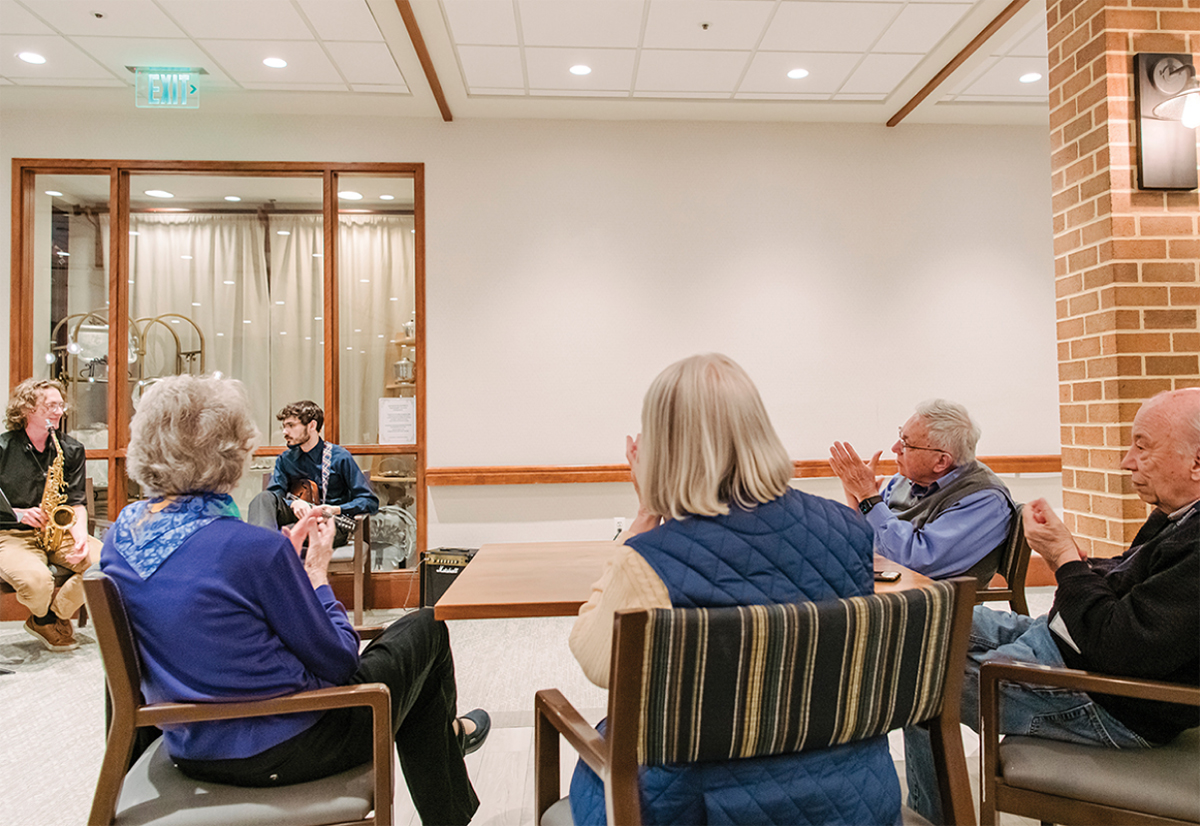Retrievers for life—that’s UMBC’s promise. And a group of residents at Charlestown’s senior living community are keeping their end of the bargain. Located two miles away from UMBC’s Catonsville campus, 60 or so retired and current faculty, staff, alumni, and friends at Charlestown are enjoying the ongoing cultural and educational perks of the two institutions. Several of these “Friends of UMBC” are laying the groundwork for continued exchange and connection—jazz concerts, classes about gender and sexuality, high-profile speakers—leaving a legacy for future generations to follow.

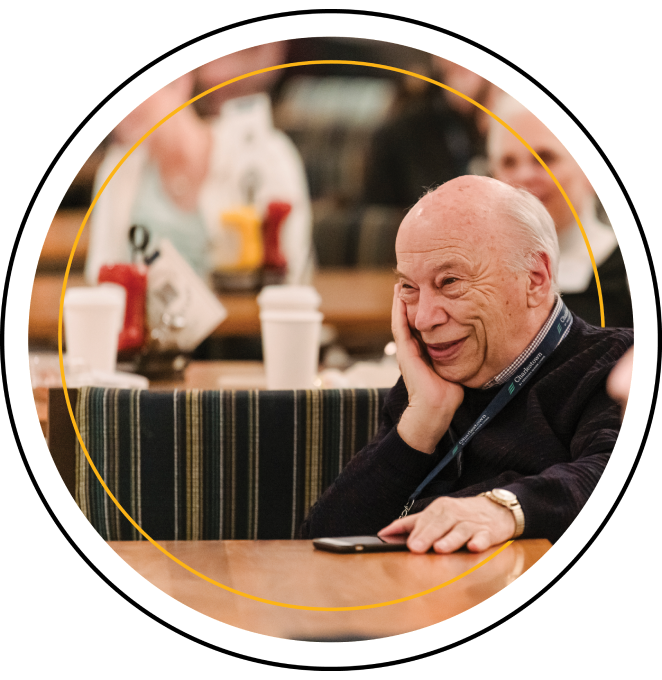
Around the café tables, heads are bobbing in rhythm tonight.
A duo of UMBC jazz students—Henry Smith ’24, on alto saxophone, and Leo Hickman ’27, on electric mandolin—are deep into their own takes on jazz standards. “Caravan,” “Misty,” and “There is No Greater Love” pour jauntily from their instruments.
The seniors here at Charlestown Senior Living know those tunes. Every song the UMBC jazz duo played was composed long before the student musicians were born, but just in the sweet spot for the audience. In the café where many have just eaten their crab soup and burgers for dinner, more than 100 Charlestown residents, including at least six who have tight connections to UMBC, clapped for the efforts of the young jazz players.
After the two finished playing “All of Me,” the crowd erupted in applause.
“That was ‘All of Me,’” Smith said into the microphone. “I feel like lots of you know that one. We’re having a great time playing for you. This is super fun!”
By 8 p.m. the crowd was stuffing dollar bills and fivers into the musicians’ tip jar by the mic and in paper bags held by volunteers at each exit. Then the seniors headed back to their apartments at the end of long corridors and in different buildings, very much like college dorms for older folks.
Strengthening Connections
A dedicated group of nearly 60 retired and current faculty and staff, alumni, or relatives have formed to promote connections between UMBC and Charlestown, a sprawling senior community with 2,000 residents. Thanks to their efforts, UMBC professors are teaching classes at the senior living community, Charlestown residents are traveling to UMBC for events, and helping the senior community’s restaurant staff with scholarship applications, funded by Charlestown residents, to UMBC and other Maryland colleges.
“That’s what I’m trying to do here, make connections,” said Art Johnson, provost emeritus who retired in 2019 from his position as political science professor and director of the Sondheim Scholars program. He moved to Charlestown in 2022 and since then, like a first-year student in search of college social groups, he has been indefatigably recruiting residents to join the Friends of UMBC at Charlestown.
“It helps maintain my connection to UMBC and lets me brag a little bit about UMBC,” Johnson said, laughing. “I meet people I wouldn’t have met otherwise. As provost, I used to promote UMBC all over. This is just an extension of that.”
Johnson met Lucy McKean on the bocce court, learned one of her kids went to UMBC, and reeled her into the group.
“Any connection will do,” Johnson said. “That’s how you build a long mailing list.”
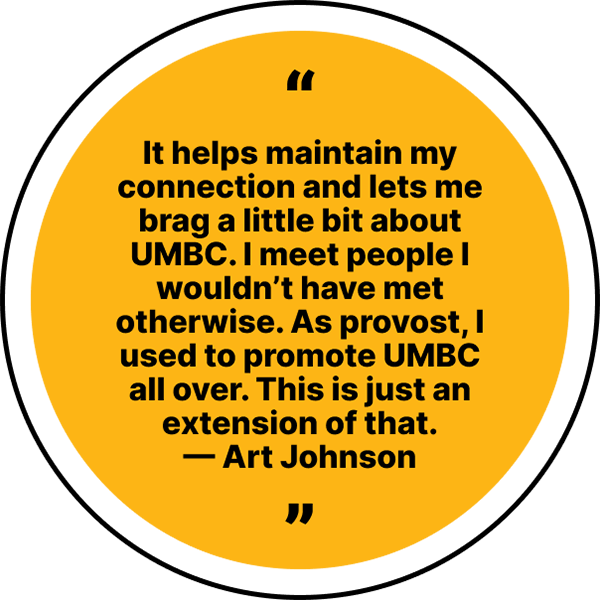
Sitting at a dinner table on the Charlestown campus, McKean and Johnson laughed together. Thanks to the Friends of UMBC group, she’s now attending jazz concerts, which she never thought she would do.
The idea for a formal-ish group sprang from a walk that Johnson and Sam Lomonaco, computer science and electrical engineering professor, took around Charlestown in the fall of 2022. They wanted to create a web of connections between UMBC and Charlestown.
Lomonaco, who has lived at Charlestown for three years, still teaches at UMBC. His commute is nicely short, he said, and having a partnership between UMBC and Charlestown offers “a good chance to do things together. I meet a lot of interesting people I would not have met otherwise. And,” he said with a grin, “I’ve gotten interested in jazz.”
Johnson and Lomonaco started small, with a social for UMBC-connected folks at Charlestown. They’ve grown to arrange trips to programs by UMBC’s arts and culture departments, as well as the Wisdom Institute (the association for retired UMBC faculty and staff), and those monthly jazz concerts. As well, Johnson and others publish a newsletter and are recruiting UMBC faculty to teach courses at Charlestown through ELLIC (Elderhostel’s Lifelong Learning Institute at Charlestown), including classes on galaxies, genes, and gender.
“Art has been a binder, keeping us together,” said Bernice De Bels ’76, English, the first Black honors graduate at UMBC, who later worked in the foreign language department and now lives at Charlestown. “With UMBC we should explore what we have to offer them and what they have to offer us.”
Keeping Memory Alive
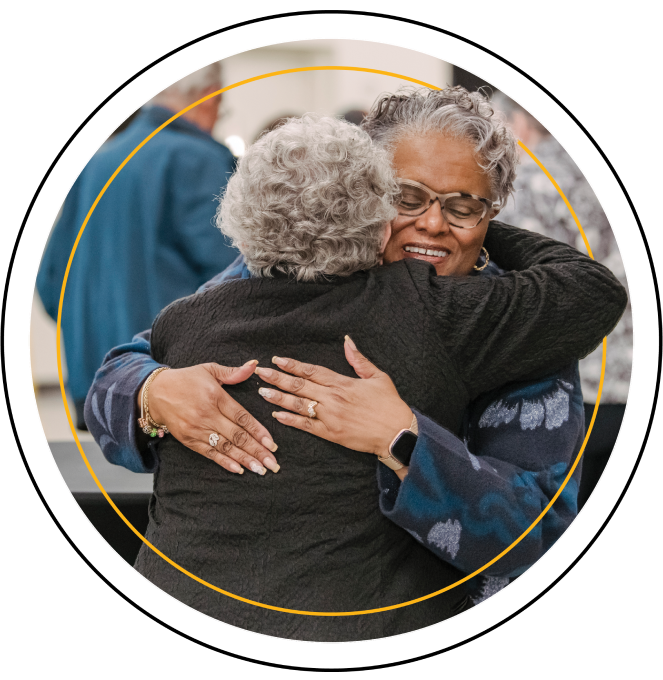
Of the many courses offered at Charlestown’s ELLIC program, nine are taught by UMBC faculty. That’s not a coincidence. Though the connections between Charlestown and UMBC have been sporadic, the institutions do have history.
John Erickson, who founded Erickson Living, which owns Charlestown, has long worked with UMBC to promote the study of getting older. Through joint efforts of Erickson and then-president Freeman Hrabowski, in 2004 the state funded the Erickson School of Aging Studies at UMBC, and Erickson Living donated $5 million for the school’s development.
Jeff Watson, who is on the faculty for the Erickson School of Aging Studies and serves as Erickson’s director of operations, also researches geriatric cognition.
“The literature and growing academic consensus is that whatever is good for the heart is good for the lungs is good for the brain,” Watson said. “Thus a healthy lifestyle, reducing inflammation and injury, while increasing physical and cognitive strength, and engaging in life, builds better brain health.”
Erickson researchers have published a study in the American Journal of Geriatric Psychiatry testing UCLA Longevity Center researchers’ findings about memory fitness on two of Erickson’s campuses, Riderwood and Oak Crest. Watson said they found that “eating wisely, exercising daily, learning consistently, relaxing meaningfully, and connecting socially” is optimal for a healthy lifestyle for seniors.
The Friends of UMBC are all about learning and socializing while they’re matchmaking between UMBC and Charlestown. For years, Johnson said, UMBC talked about collaborating with Charlestown, but it never really manifested to the extent they envisioned.
“One of our long-term goals is to try to bring the two institutions closer together,” Johnson said. “We could cooperate on issues: sustainability, local transportation, good health care…. We talked about it years ago when I was at UMBC, but it never happened.”
Same Goals, From Different Directions
UMBC’s Wisdom Institute is trying to accomplish the same community-building as the UMBC group at the senior village. But now, they’re working together.
Johnson, who serves on the Wisdom Institute’s board, is the hub, said Diane Lee, director of the UMBC organization for retirees.
“He brilliantly brought people together,” Lee said. “What a wonderful way to reconnect with these folks.”
The Wisdom Institute is printing extra copies of its newsletters for distribution at Charlestown, and for a recent event, the institute rented out the Charlestown bus to bring UMBC-curious residents to a lunch and keynote by WJZ-TV anchor Denise Koch. The institute plans to invite Charlestown residents to other events, including observatory tours in UMBC’s Physics Building, monthly lunches, discussions, and concerts.
“We really want to forge this tie,” Lee said. “We like the idea of reciprocity.”
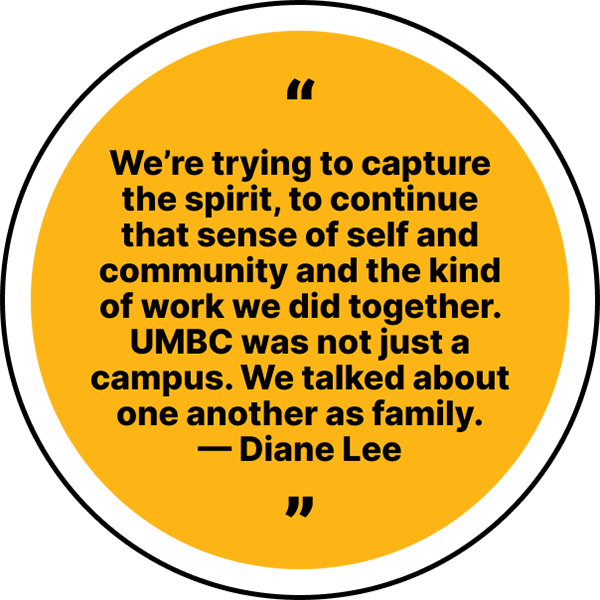
For 30 years, Lee taught at UMBC in the education department and worked in the administration. “I came as a visiting assistant professor with no intention of staying. But it was an exciting place and an exciting time to be there.”
She, like many of the longtime UMBC staff and faculty who now live at Charlestown, helped build UMBC from the ground up into the institution it is today.
“It’s a wonderful place to be,” Lee said. The work was demanding but energizing, she said. “And people cared. We’re trying to capture the spirit, to continue that sense of self and community and the kind of work we did together. UMBC was not just a campus. We talked about one another as family.”
Dream Students
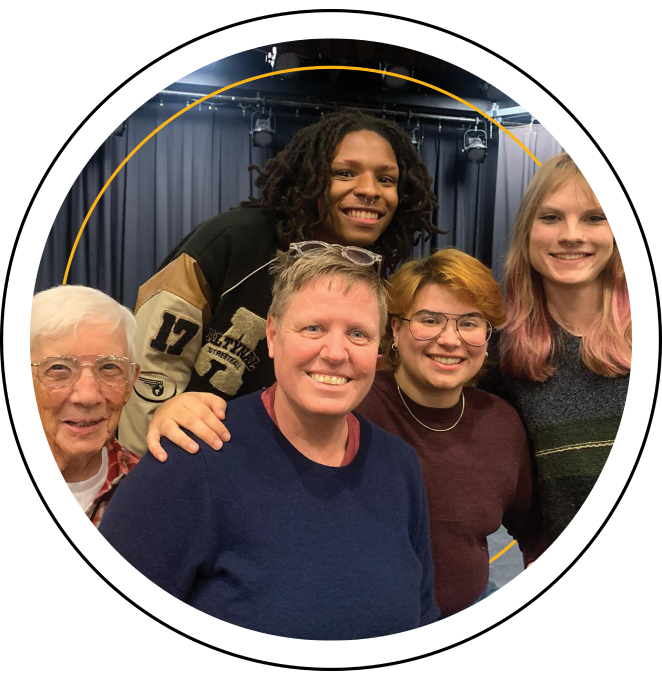
Kate Drabinski, principal lecturer in gender and women’s and sexuality studies, has visited Charlestown eight times to teach over three years. She jokes that if she teaches two more classes, she’ll earn a punch card for a free meal at Charlestown’s restaurant.
“It’s been some of the most valuable teaching I’ve done,” Drabinski said of the senior students learning through the ELLIC program, Enjoy Lifelong Learning in Charlestown. “They are rapt, they take notes, they ask questions. It’s a dream setup.”
On a spring Tuesday, Drabinski brought UMBC students who identify as gay, transgender, and nonbinary to the senior living community to tell their coming out stories, along with their struggles and joys around gender and sexuality.
“It’s been really moving for us, and also for the residents, to make these connections,” Drabinski said.
One student, who performs in drag shows, grew up on the same block as one of the residents, Drabinski said. The resident stood up and said she was proud of the student, Drabinski said, “for being brave and sharing her story.”
At least one of the Charlestown residents has a nonbinary grandchild, Drabinski said. “They probably feel uncomfortable asking their grandchild these questions,” she continued, but were curious and asked many questions of the students without the fear of rejection from a family member.
And she asked the students a question in front of the residents: “What do you wish your grandparents had said to you when you told them your coming out story? They said, ‘I want you to be part of my life—I trust you and this is a gift I’m giving.’”
They also discussed the generational misunderstandings, Drabinski said, “hot-button issues.” One resident asked why drag queens were reading stories at libraries. Students were worried about the question, but Drabinski said she maneuvered the fear in the room and, ultimately, they had a “fantastic discussion, the kind of discussion you only have when you have dedicated intergenerational space.”
Drabinski said her students came away from the interaction enriched. “Just because people are old doesn’t mean they are hostile. It was a huge benefit to students to get to practice telling their stories, to build confidence, and to learn from the questions the seniors are asking. It was a really positive experience.”
Familiar Tunes in a New Way
Now that he’s retired, Johnson has time to fulfill the goal of bringing UMBC and Charlestown closer.
One evening before the jazz concert, Johnson pulled together members of his group of UMBC folks to chat in the atrium of one of Charlestown’s buildings.
Pat Bettridge, who came to UMBC in 1966 and did graduate work in English, was married to English professor William Bettridge, and remembers UMBC in the 1960s as “a hole in the ground.” Bettridge, who has lived at Charlestown for 11 years, helped bring UMBC artists, dancers and theater productions to the senior living community over the years.
“It’s a good idea to get us together, to continue what we started 10 years ago,” Bettridge said.
Sebastian Petix, organizer of Charlestown’s jazz club and a friend of the Friends of UMBC, has worked with Matt Belzer, senior lecturer in jazz studies at UMBC, to bring the jazz groups to Charlestown. Petix, who played piano and trumpet and organized concert series before retirement, formed the Charlestown Jazz Club, and quickly signed onto the idea of bringing Retriever musicians onto Charlestown’s campus.
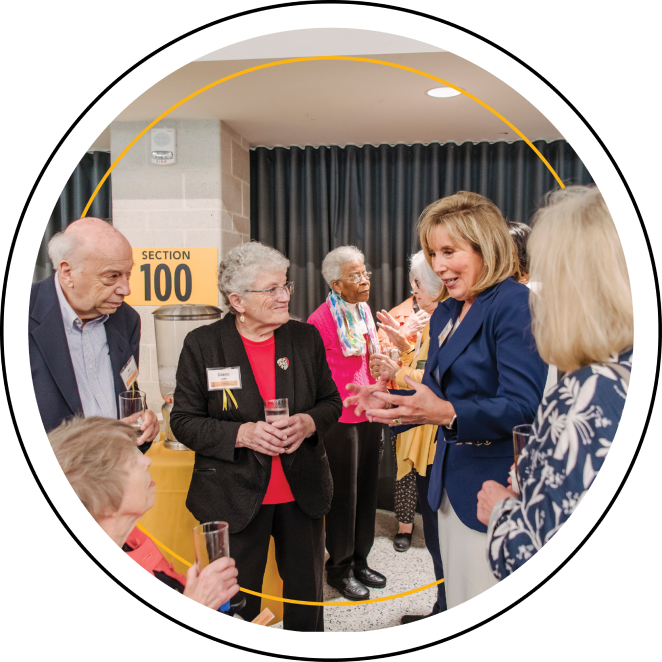
“The audiences have really loved them,” Petix said. His jazz club, including some UMBC members, are planning a trip to see the UMBC semester’s final jazz recitals.
Valerie Woolston, whose husband Charles started as UMBC’s admissions director in 1968, helps edit the Friends of UMBC newsletter. She’s attended every jazz concert.
“They’re terrific,” Woolston said, nodding at the duo warming up in front of the crowd. “It’s really great to see how young people develop. They write their own music,” she said, almost as proud as a grandparent.
“I’m really pulled to UMBC,” said Woolston. “I’m really proud of it.”
Then she settled down with friends to watch the students play old, familiar tunes in a new way.
“I’m really pulled to UMBC,” said Woolston. “I’m really proud of it.”
Then she settled down with friends to watch the students play old, familiar tunes in a new way.
Tags: Aging Studies, erickson, Feature, GWSS, Music, Spring 2024, Wisdom Institute

